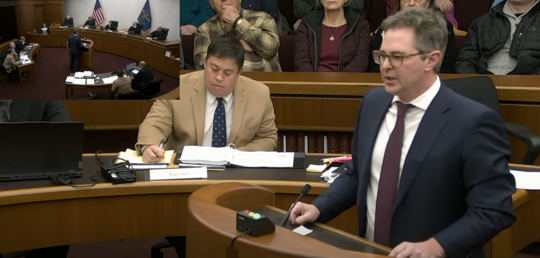Domina Law Group Managing Lawyer Brian Jorde recently appeared before the North Dakota Supreme Court as part of the ongoing litigation over Summit Carbon Solutions’ controversial carbon capture pipeline.
As reported by KFYR TV and the Iowa Capital Dispatch, Jorde appeared before the ND Supreme Court in mid-December on behalf of landowners who are challenging the constitutionality of a state law that allows survey crews to access private property.
As Jorde argued before the Court, the statute as written gives Summit Carbon Solutions, one of several companies with plans to construct massive, multi-state carbon pipelines in the Midwest, almost complete access to private land. Stressing the scope of the law, which allows survey crews to show up at any time, and its few limitations, he told the Court:
“24 hours a day, seven days a week, 365 days a year without limit to duration, frequency, where the invasion can take place and what can happen, so long as it falls under survey examination.”
In addition to discussing how the law gives survey crews virtually unlimited access to private land, Jorde went on to discuss other problematic issues with the law, including the lack of any requirement for companies to notify landowners about surveys. In addition to requiring written notice, Jorde argued, the law should also require that landowners be compensated up front and provide them with the right to challenge access that has been granted in court.
“They have a say-so to show up in court if they don’t voluntarily agree on the front end – which most people do when they come seeking an easement. But they have the right to be heard. And that’s what my clients as North Dakotans want, we want to be heard,” Jorde said.
Jorde also raised arguments that Summit’s need for survey access is based on convenience rather than necessity and that North Dakota’s eminent domain process already provides a way for companies to request and obtain access easements through the courts, provided they can prove that projects are related to public use and meet other legal requirements.
“Eminent domain already has the procedure for this all laid out,” Jorde said. “All they have to do is simply get an access easement for the survey.”
Attorneys for Summit and the state maintained that the law is constitutional, with the state’s attorney further cautioning that the striking down the survey statute could have implications beyond pipeline construction, such as slowing down the process for water projects and road construction. But as Jorde argued, North Dakota has “quick take” access, which allows the state to petition a court for easement access and be on the property the same day. “This isn’t going to slow things down if you strike the statute wholesale,” Jorde said.
Ultimately, Jorde focused on the constitutionality of the law, its impact on the rights of his clients, and how they feel about the fact that the surveys stem from a private company’s plans to reap massive profits from using their land.
“But the point is, you are taking away a fundamental constitutional right by invasion. The use and the occupation make it even worse,” said Jorde.
Watch footage of Brian Jorde arguing before the ND Supreme Court here.
Jorde, Domina Law Representing Midwest Landowners in Fight Against Carbon Pipelines
Brian Jorde and our team at Domina Law have been intimately involved in representing landowners across the Midwest with properties that fall along paths where several controversial carbon capture pipelines have been proposed and have secured a string of victories in disputing and defeating these projects and protecting our clients’ rights.
One recent victory in the ongoing battle came in October 2023 when Jorde and our firm prevailed in helping landowners defeat Navigator CO2 Ventures’ Heartland Greenway pipeline, which was slated to span over 1,300 miles across five separate states. The historic victory was a testament to the legal strategy led by Brian Jorde, who helped landowners challenge Navigator’s permit applications in South Dakota, Iowa, and other states. It also inspired hope among numerous other landowners challenging carbon pipeline proposals from other private companies, including Summit Carbon Solutions and Wolf Carbon Solutions.
In addition to helping landowners voice their concerns over these pipelines’ potential impact on health, safety, and farmland, Jorde and our team continue to challenge pipeline companies’ attempts to use eminent domain – a right typically reserved for the government and public use projects – to access private property and construct their pipelines.
These challenges have significantly slowed Summit’s efforts to obtain survey access, easements, and route permits for its projects. In August, for example, the North Dakota Public Service Commission voted unanimously to deny Summit’s request for a siting permit for its project.
Jorde and our team at Domina Law continue to fight for landowners across the Midwest in matters involving carbon pipelines. You can learn more about our carbon pipeline litigation work and find the latest updates on our blog.
You can read the full articles about Brian Jorde’s arguments before the North Dakota Supreme Court on KFYR TVand the Iowa Capital Dispatch.

